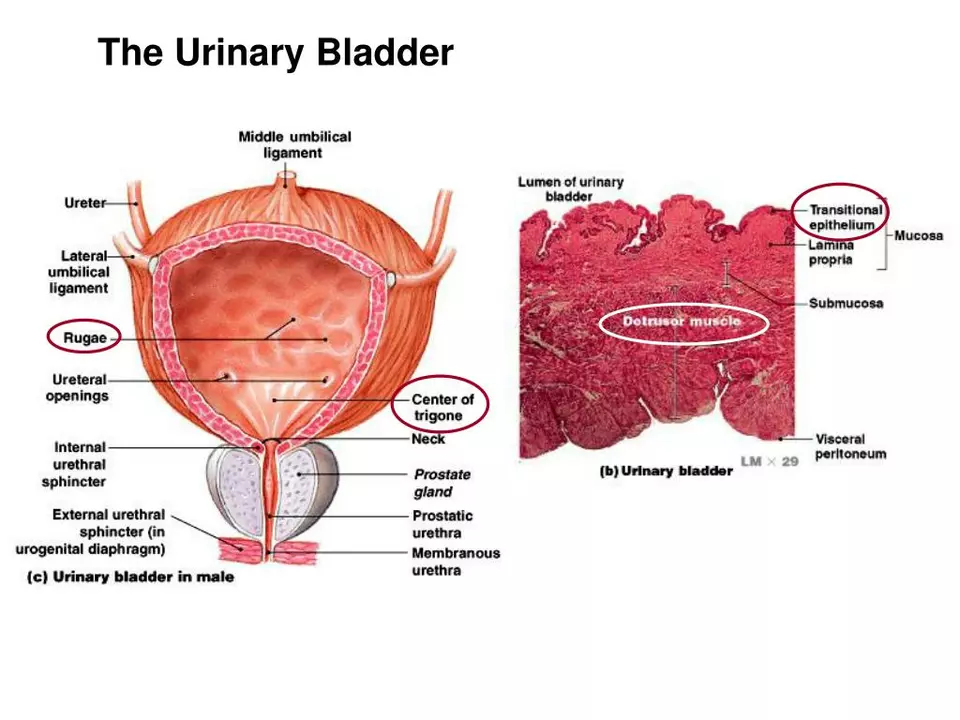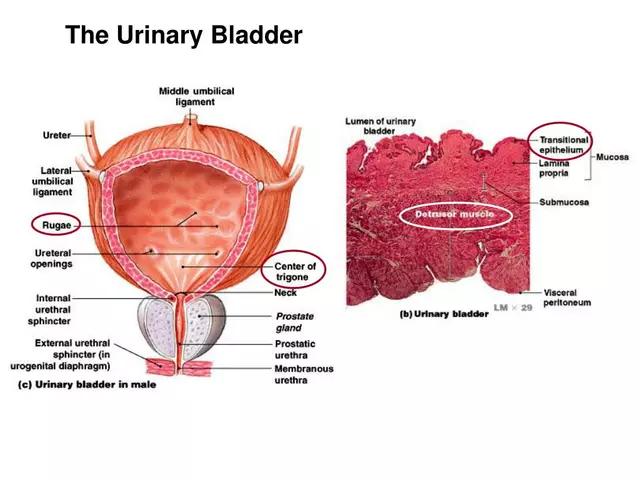Introduction to Bladder Stones and Urinary Tract Muscle Spasms
As a health-conscious individual, I always strive to learn more about various health conditions that can affect our daily lives. Recently, I came across an interesting connection between bladder stones and muscle spasms of the urinary tract. In this article, we will explore this connection, learn about the causes and symptoms of each condition, and discuss possible prevention and treatment options. Let's dive in and expand our knowledge on this intriguing topic.
Understanding Bladder Stones: Causes and Symptoms
Bladder stones, also known as vesical calculi, are hard masses of minerals that form in the bladder. These stones can vary in size and shape, ranging from tiny grains to large, golf ball-sized stones. Bladder stones form when urine in the bladder becomes highly concentrated, allowing minerals to crystallize and clump together.
There are several factors that can contribute to the formation of bladder stones, including urinary tract infections, an enlarged prostate, or nerve damage that affects bladder function. Common symptoms associated with bladder stones include lower abdominal pain, frequent and painful urination, blood in the urine, and difficulty emptying the bladder completely.
Exploring Muscle Spasms of the Urinary Tract
Muscle spasms of the urinary tract, also called urinary tract spasms, refer to involuntary contractions of the muscles in the bladder, ureters, and urethra. These spasms can cause discomfort, pain, and difficulties with urination. Urinary tract spasms can be caused by various factors, such as urinary tract infections, bladder inflammation, and certain medications.
Some common symptoms of urinary tract spasms include a frequent and urgent need to urinate, pain or discomfort in the lower abdomen, and a feeling that the bladder is not completely empty after urination. In some cases, these spasms can also lead to urinary incontinence, where an individual is unable to control the release of urine.
Establishing the Connection between Bladder Stones and Urinary Tract Spasms
Bladder stones and urinary tract spasms may seem like two separate issues, but they are actually closely related. Bladder stones can cause irritation and inflammation of the bladder lining, which can, in turn, lead to the development of muscle spasms in the urinary tract. Additionally, bladder stones can obstruct the flow of urine, causing pressure to build up in the bladder and leading to spasms.
Conversely, urinary tract spasms can contribute to the formation of bladder stones. As the spasms cause the bladder to contract involuntarily, urine may not be expelled completely, leading to urine stagnation. This stagnant urine can then become highly concentrated, providing the perfect environment for bladder stones to form.
Preventing Bladder Stones and Urinary Tract Spasms
Now that we've established the connection between bladder stones and urinary tract spasms, let's discuss some strategies for preventing these conditions. Staying well-hydrated is crucial for preventing both bladder stones and urinary tract spasms, as it helps dilute urine and prevents mineral buildup. Aim to drink enough water throughout the day to keep your urine light yellow or clear in color.
Additionally, maintaining a healthy and balanced diet can help prevent the formation of bladder stones. Limit your intake of foods high in oxalates, such as spinach, beets, and chocolate, as these can contribute to the formation of calcium oxalate stones. Also, try to include more fruits and vegetables, whole grains, and lean proteins in your diet to promote overall urinary tract health.
Treatment Options for Bladder Stones and Urinary Tract Spasms
If you are experiencing symptoms of bladder stones or urinary tract spasms, it's essential to consult with a healthcare professional for proper diagnosis and treatment. Treatment options for bladder stones may include increased fluid intake to help flush out small stones or medical procedures to break up or remove larger stones. In some cases, treating the underlying cause of the bladder stones, such as an enlarged prostate or a urinary tract infection, can help alleviate the problem.
For urinary tract spasms, treatment options may include medications to relax the bladder muscles, such as anticholinergics or alpha-blockers. Additionally, addressing any underlying causes, such as a urinary tract infection or bladder inflammation, can help alleviate the spasms. In some cases, lifestyle changes and physical therapy can also be beneficial in managing urinary tract spasms.
Conclusion: Taking Control of Your Urinary Tract Health
Understanding the connection between bladder stones and urinary tract muscle spasms is essential for maintaining optimal urinary tract health. By staying informed about these conditions, their causes, and their symptoms, we can take the necessary steps to prevent and treat them effectively. Remember to stay well-hydrated, maintain a healthy diet, and consult a healthcare professional if you experience any symptoms related to bladder stones or urinary tract spasms. Let's take control of our urinary tract health and lead a more comfortable, pain-free life!




April Barrow
May 21, 2023 at 11:11This is a really clear breakdown. I’ve had recurrent UTIs and never connected them to stone formation until now. Hydration really is the silent hero here. I keep a water tracker now and it’s made a difference.
Also, avoiding citrus helped me-turns out my body reacts badly to citric acid even if it’s supposed to prevent stones. Weird, but true.
Melody Jiang
May 23, 2023 at 08:01It’s fascinating how the body’s systems loop back on themselves like this. The bladder isn’t just a storage tank-it’s an active organ with its own rhythm. When that rhythm gets disrupted by stones, the muscles panic. It’s like your car’s fuel pump straining because the filter’s clogged. The system isn’t broken, it’s just stuck in a feedback loop of stress.
Maybe we need to think less about ‘treating symptoms’ and more about restoring balance. The body wants to heal-it just needs the right conditions.
alex terzarede
May 24, 2023 at 15:55The link between incomplete voiding and stone formation is well-documented in urology literature. Studies from the 2010s show that residual urine volume above 50 mL significantly increases crystallization risk. Alpha-blockers help by relaxing the detrusor and sphincter-reducing spasm-induced stagnation. Not magic, just physiology.
Dipali patel
May 25, 2023 at 23:43Wait… so you’re telling me this isn’t just about diet? I’ve been avoiding oxalates for years but still get stones. What if it’s the water? They put fluoride in it to make us urinate wrong. And the pipes-old copper leaches copper ions that bind with calcium and form those damn crystals. They know. They’ve always known. I’ve seen the documents.
Also, my neighbor’s WiFi router? It messes with bladder nerves. I’m not joking.
Jasmine L
May 26, 2023 at 21:46I’ve been dealing with this for years 😩 honestly, just drinking more water changed everything. I used to think I was ‘fine’ if I wasn’t in pain-but turns out, dark yellow = danger zone. Now I keep a bottle by my desk and I’m basically a walking hydration evangelist 🌱💧
Also, cranberry juice isn’t a cure but it helps my bladder feel calm. YMMV!
lisa zebastian
May 28, 2023 at 11:28This is all corporate urology propaganda. Real issue? Glyphosate in the food supply. It disrupts the gut-bladder axis. Studies from 2018 show glyphosate binds to magnesium, causing calcium to precipitate. They don’t want you to know because Big Pharma profits off lithotripsy. Your ‘hydration’ advice? A distraction. Go organic or get stones. Period.
Jessie Bellen
May 30, 2023 at 09:00You’re all missing the point. If you’re getting stones, you’re already compromised. Stop blaming water. Start blaming your hormones. Estrogen dominance = calcium retention. Test your levels. Stop eating soy. Stop drinking almond milk. It’s not about hydration-it’s about endocrine sabotage.
Jasmine Kara
May 31, 2023 at 09:45i never knew stones could cause spasms 😳 i thought it was just like… a bad UTI. i drink like 3 liters a day but still get them. maybe i need to cut out soda? or is it the tea? idk anymore lol